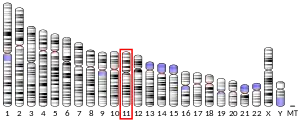API5
The human gene API5 encodes the protein Apoptosis inhibitor 5.[5][6]
| API5 | |||||||||||||||||||||||||
|---|---|---|---|---|---|---|---|---|---|---|---|---|---|---|---|---|---|---|---|---|---|---|---|---|---|
| |||||||||||||||||||||||||
| Identifiers | |||||||||||||||||||||||||
| Aliases | API5, AAC-11, AAC11, apoptosis inhibitor 5 | ||||||||||||||||||||||||
| External IDs | OMIM: 609774 MGI: 1888993 HomoloGene: 4809 GeneCards: API5 | ||||||||||||||||||||||||
| |||||||||||||||||||||||||
| |||||||||||||||||||||||||
| |||||||||||||||||||||||||
| Orthologs | |||||||||||||||||||||||||
| Species | Human | Mouse | |||||||||||||||||||||||
| Entrez | |||||||||||||||||||||||||
| Ensembl | |||||||||||||||||||||||||
| UniProt | |||||||||||||||||||||||||
| RefSeq (mRNA) | |||||||||||||||||||||||||
| RefSeq (protein) | |||||||||||||||||||||||||
| Location (UCSC) | Chr 11: 43.31 – 43.34 Mb | Chr 2: 94.41 – 94.44 Mb | |||||||||||||||||||||||
| PubMed search | [3] | [4] | |||||||||||||||||||||||
| Wikidata | |||||||||||||||||||||||||
| |||||||||||||||||||||||||
This gene encodes an apoptosis inhibitory protein whose expression prevents apoptosis after growth factor deprivation. This protein suppresses the transcription factor E2F1-induced apoptosis and also interacts with, and negatively regulates acinus, a nuclear factor involved in apoptotic DNA fragmentation. Its depletion enhances the cytotoxic action of chemotherapeutic drugs. Crystal structure of API5 exhibited the function for protein-protein interaction [7]
Diseases associated with API5 include colon adenocarcinoma, and cervical cancer.
API5 functions in nuclear export of mRNA.[8]
References
- GRCh38: Ensembl release 89: ENSG00000166181 - Ensembl, May 2017
- GRCm38: Ensembl release 89: ENSMUSG00000027193 - Ensembl, May 2017
- "Human PubMed Reference:". National Center for Biotechnology Information, U.S. National Library of Medicine.
- "Mouse PubMed Reference:". National Center for Biotechnology Information, U.S. National Library of Medicine.
- Tewari M, Yu M, Ross B, Dean C, Giordano A, Rubin R (September 1997). "AAC-11, a novel cDNA that inhibits apoptosis after growth factor withdrawal". Cancer Research. 57 (18): 4063–9. PMID 9307294.
- "Entrez Gene: API5 apoptosis inhibitor 5".
- Han BG, Kim KH, Lee SJ, Jeong KC, Cho JW, Noh KH, Kim TW, Kim SJ, Yoon HJ, Suh SW, Lee S, Lee BI (March 2012). "Helical repeat structure of apoptosis inhibitor 5 reveals protein-protein interaction modules". The Journal of Biological Chemistry. 287 (14): 10727–37. doi:10.1074/jbc.M111.317594. PMC 3322819. PMID 22334682.
- Bong SM, Bae SH, Song B, Gwak H, Yang SW, Kim S, Nam S, Rajalingam K, Oh SJ, Kim TW, Park S, Jang H, Lee BI (2020). "Regulation of mRNA Export Through API5 and Nuclear FGF2 Interaction". Nucleic Acids Res. 48 (11): 6340–6352. doi:10.1093/nar/gkaa335. PMC 7293033. PMID 32383752.
Further reading
- Gianfrancesco F, Esposito T, Ciccodicola A, D'Esposito M, Mazzarella R, D'Urso M, Forabosco A (1999). "Molecular cloning and fine mapping of API5L1, a novel human gene strongly related to an antiapoptotic gene". Cytogenetics and Cell Genetics. 84 (3–4): 164–6. doi:10.1159/000015247. PMID 10393420. S2CID 44601647.
- Kim JW, Cho HS, Kim JH, Hur SY, Kim TE, Lee JM, Kim IK, Namkoong SE (April 2000). "AAC-11 overexpression induces invasion and protects cervical cancer cells from apoptosis". Laboratory Investigation; A Journal of Technical Methods and Pathology. 80 (4): 587–94. doi:10.1038/labinvest.3780008. PMID 10780674.
- Van den Berghe L, Laurell H, Huez I, Zanibellato C, Prats H, Bugler B (November 2000). "FIF [fibroblast growth factor-2 (FGF-2)-interacting-factor], a nuclear putatively antiapoptotic factor, interacts specifically with FGF-2". Molecular Endocrinology. 14 (11): 1709–24. doi:10.1210/me.14.11.1709. PMID 11075807.
- Sutherland HG, Mumford GK, Newton K, Ford LV, Farrall R, Dellaire G, Cáceres JF, Bickmore WA (September 2001). "Large-scale identification of mammalian proteins localized to nuclear sub-compartments". Human Molecular Genetics. 10 (18): 1995–2011. doi:10.1093/hmg/10.18.1995. PMID 11555636.
- Li Z, Hu CY, Mo BQ, Xu JD, Zhao Y (April 2003). "[Effect of beta-carotene on gene expression of breast cancer cells]". AI Zheng = Aizheng = Chinese Journal of Cancer. 22 (4): 380–4. PMID 12703993.
- Andersen JS, Lam YW, Leung AK, Ong SE, Lyon CE, Lamond AI, Mann M (January 2005). "Nucleolar proteome dynamics". Nature. 433 (7021): 77–83. Bibcode:2005Natur.433...77A. doi:10.1038/nature03207. PMID 15635413. S2CID 4344740.
- Kim JE, Tannenbaum SR, White FM (2005). "Global phosphoproteome of HT-29 human colon adenocarcinoma cells". Journal of Proteome Research. 4 (4): 1339–46. doi:10.1021/pr050048h. PMID 16083285.
- Olsen JV, Blagoev B, Gnad F, Macek B, Kumar C, Mortensen P, Mann M (November 2006). "Global, in vivo, and site-specific phosphorylation dynamics in signaling networks". Cell. 127 (3): 635–48. doi:10.1016/j.cell.2006.09.026. PMID 17081983. S2CID 7827573.
- Morris EJ, Michaud WA, Ji JY, Moon NS, Rocco JW, Dyson NJ (November 2006). "Functional identification of Api5 as a suppressor of E2F-dependent apoptosis in vivo". PLOS Genetics. 2 (11): e196. doi:10.1371/journal.pgen.0020196. PMC 1636698. PMID 17112319.

- Han BG, Kim KH, Lee SJ, Jeong KC, Cho JW, Noh KH, Kim TW, Kim SJ, Yoon HJ, Suh SW, Lee S, Lee BI (2012). "Helical repeat structure of apoptosis inhibitor 5 reveals protein-protein interaction modules". J Biol Chem. 287 (14): 10727–37. doi:10.1074/jbc.M111.317594. PMC 3322819. PMID 22334682.
- Bong SM, Bae SH, Song B, Gwak H, Yang SW, Kim S, Nam S, Rajalingam K, Oh SJ, Kim TW, Park S, Jang H, Lee BI (2020). "Regulation of mRNA Export Through API5 and Nuclear FGF2 Interaction". Nucleic Acids Res. 48 (11): 6340–6352. doi:10.1093/nar/gkaa335. PMC 7293033. PMID 32383752.
This article is issued from Wikipedia. The text is licensed under Creative Commons - Attribution - Sharealike. Additional terms may apply for the media files.




